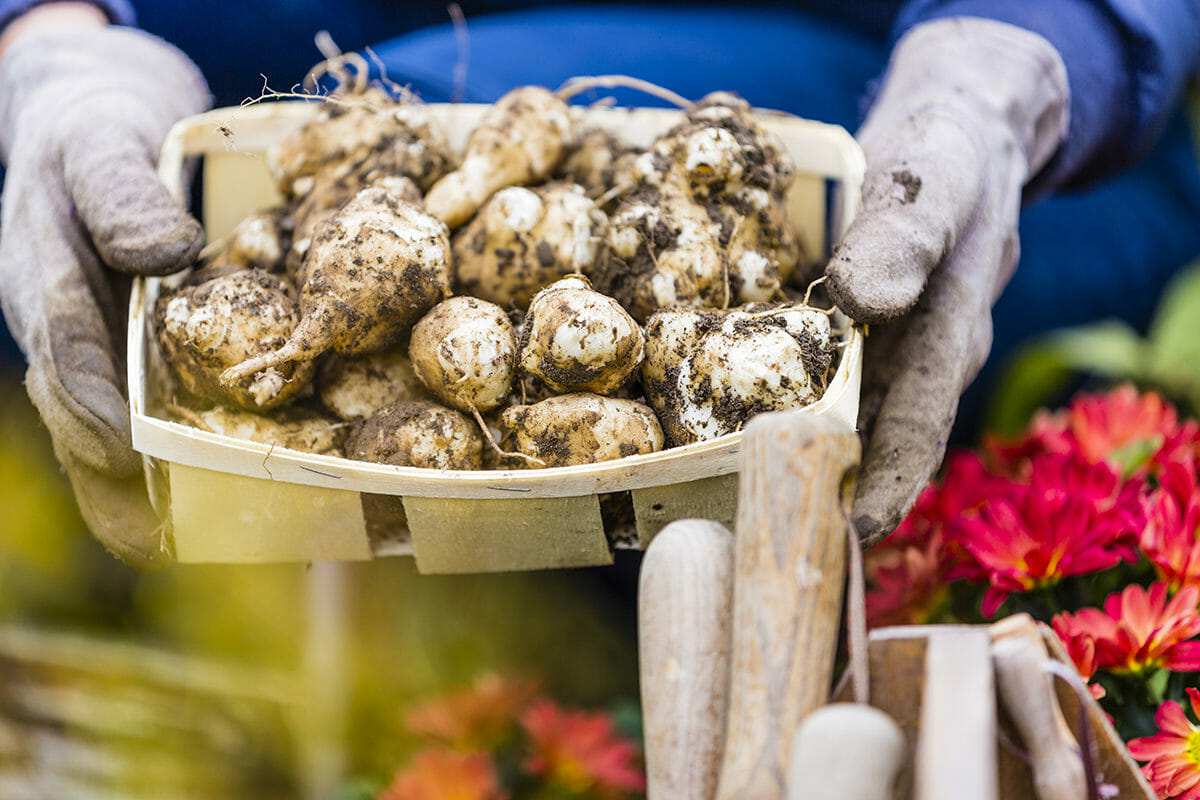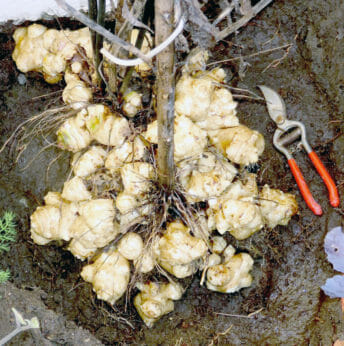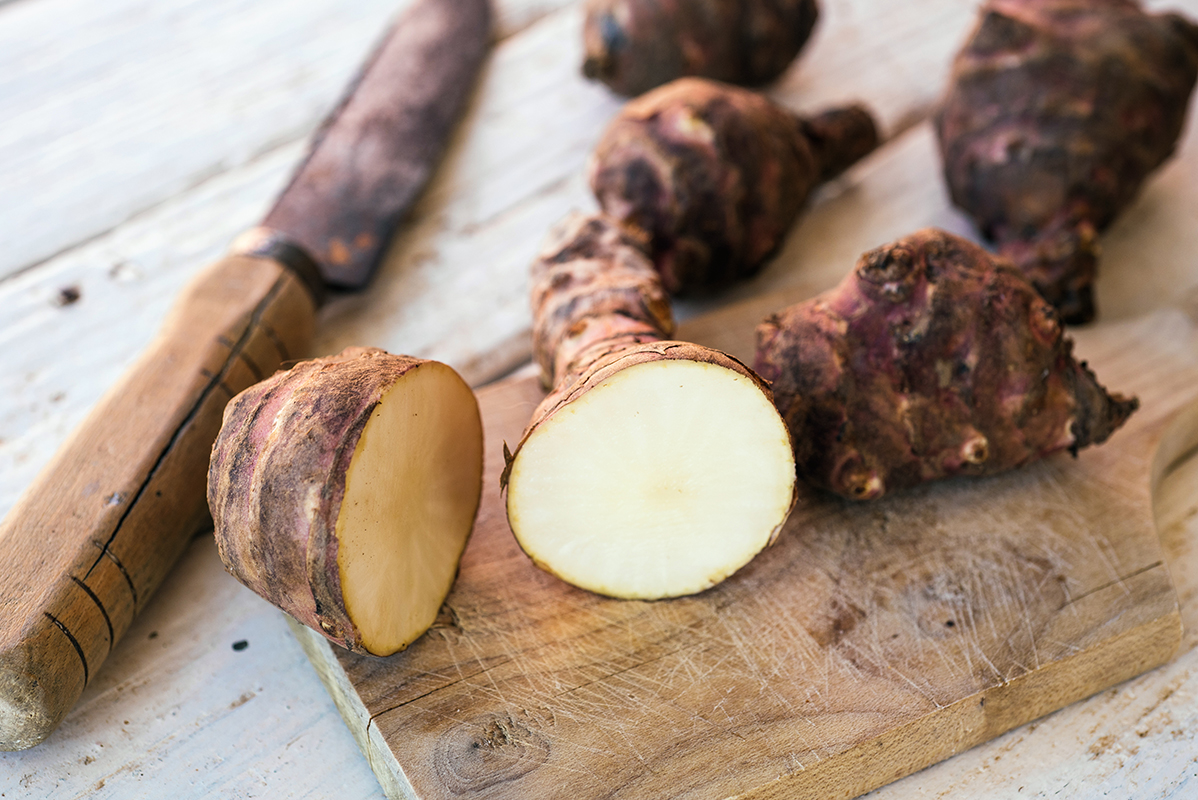Looking For a Sunchoke Recipe That Doesn’t Cause Gas? Try Lemon Juice
Jerusalem artichokes (aka sunchokes) are delicious, but known to cause painful gastric issues. This age old sunchoke recipe, however, seems to hold the cure.
Looking For a Sunchoke Recipe That Doesn’t Cause Gas? Try Lemon Juice
Jerusalem artichokes (aka sunchokes) are delicious, but known to cause painful gastric issues. This age old sunchoke recipe, however, seems to hold the cure.

A basket of sunchokes newly harvested. Photo via Shutterstock
I learned this the hard way after a surprise bumper crop of Jerusalem artichokes in my northern California garden last year. I had acquired a handful of these knobbly tubers at a neighborhood crop swap, and out of idle curiosity stuck them in my backyard soil – and promptly forgot about them.

Within months, ten-foot stalks towered over my yard, and at harvest time in late fall, I discovered that the stalks’ underground tubers had replicated themselves exponentially. (Under the right conditions, sunchokes grow so prolifically that they’re sometimes considered an invasive species.) I found myself digging up bucketloads of tennis-ball-sized tubers, which when roasted, sautéed or boiled at first tasted heavenly – yet then, a few hours later, caused spasms of pain and auditory embarrassment at the other end of the alimentary canal. I became determined to find a way to cook these delicious little devils in such a way that they didn’t cause flatulence.
Here’s what I learned:
The Culprit: Inulin
Ironically, the very thing that makes Jerusalem artichokes delicious and healthy is also the source of their unfortunate intestinal effects: inulin, an unusual type of carbohydrate that has recently become a trendy prebiotic supplement for gut health. Plants naturally containing inulin – and Jerusalem artichokes have a higher percentage of inulin by weight than almost any other vegetable – are naturally sweet and satisfying, yet have almost no functional calories since humans can’t digest inulin. But when enough inulin reaches the lower part of the intestinal tract, bacteria gobble it up and produce methane – which explains the brutally accurate nickname “Jerusalem fartichokes.”
Learn More
How to Store Root Crops (Including Sunchokes)
Tuber…or Not Tuber: The Basics
Jerusalem artichokes are neither artichokes nor from Jerusalem, but instead are the underground tubers of a tall plant closely related to sunflowers (for which the Italian word is girasole, phonetically bastardized to “Jerusalem” in English). They taste almost exactly like artichoke hearts, but with the satisfying starchiness of potatoes. (To avoid the cumbersome and confusing name, some retailers market them as “sunchokes,” a portmanteau of “sunflower” and “artichoke.”)

As generations of cooks have learned through trial and error, no matter what you do to sunchokes – fry, boil, roast, braise, blanche, steam, simmer for hours or blast with high heat – their inulin will get you in the end.
How Much Is Too Much?
In my quest to de-gas my mountain of homegrown sunchokes, I learned that the problem was dosage: inulin become problematic only if you eat a lot of it.
“We regularly feed volunteers in nutritional trials up to 20 grams per day of inulin without significant problems,” says Bob Rastall, a biochemistry expert and Professor of Food Biotechnology at England’s University of Reading. “The issue with Jerusalem artichokes is that they can contain a lot of inulin – as much as 30 percent by fresh weight. It would be easy for a casual diner to consume enough inulin in one serving to cause problems.”
He’s not kidding: the average sunchoke tuber weighs about three ounces, or 85 grams; if it’s 30 percent inulin, that’s 25 grams of the gas-maker right there, already over the daily clinical dose. And who cooks only one tuber? I routinely would cook several at a time, just as I do potatoes. Is there any way to battle the inulin situation?
The Acid Test: A Way To Fart-Free ‘Chokes?
While researching my problem, I eventually stumbled upon an obscure folk custom that claimed to solve the vegetable’s seemingly intractable gas problem.
I learned that indigestible polysaccharides such as inulin can be converted to digestible sugars by “acid hydrolysis.” In layman’s terms, that means bathing the inulin in something watery and acidic. Lemon juice, perhaps?
Read More
A Guide to the Roots and Tubers You Didn’t Know You Loved

Sure enough, that’s just what this centuries-old recipe for rendering Jerusalem artichokes fart-free – and one of the few methods of preparation I hadn’t tried – called for: boiling them in lemon juice. Modern science concurs: “Boiling Jerusalem artichokes in an acid such as lemon juice or vinegar will hydrolyze the inulin to fructose and small amounts of glucose,” Rastall advises.
So I gave it a try, boiling quarter-inch-thick sunchoke slices for 15 minutes in just enough lemon juice to cover them. They turned out amazingly sweet and still delicious, although – as Rastall had warned – they’d lost some of their artichoke flavor. But the stove-top hydrolysis worked: Eating a heaping bowl of lemon-boiled sunchokes produced no intestinal after-effects whatsoever. Success! (Boiling them in vinegar also hydrolyzes the inulin, I discovered, but leaves them with a harsh, astringent taste.)
Option 2: Pickle the Problem Away
Here’s another solution: Traditional fermentation-style pickling also removes sunchokes’ gaseous effects – while retaining their artichoke flavor. Gardening mavens Linda Ziedrich and Rose Marie Nichols McGee developed a game-changing recipe that yields completely gas-free Jerusalem artichoke pickles that keep all their wonderful crunch and taste.
Read More
10 Drought-Tolerant Plants to Have a Bountiful Garden – With Less Water
How? During this pickling process, lactobacillus bacteria gorge on the inulin and convert it to gas, which manifests as bubbles in the pickling jar, rather than your intestines. By the time the pickles are ready to eat, the inulin has already been mostly consumed, and the “bacteria farts” float away painlessly when you open the jar.
A Little Inulin Is Still Your Friend
Rastall, for his part, remains a vigorous advocate for inulin and its prebiotic benefits: “I’m interested in getting people to consume more prebiotics such as inulin on a regular basis.” His fix for the overdose of inulin in Jerusalem artichokes? Build a tolerance. “Rather than avoiding all inulin, I suggest that people consume small quantities on a regular basis,” he notes. “Their gut microbiota will adapt – the proportion of beneficial bacteria will grow, while the gas-producing bacteria will diminish – and after a while they will be able to eat Jerusalem artichokes without discomfort.”
Luckily, according to Rastall, both the hydrolysis and pickling methods retain enough of the inulin for health-inducing prebiotic effects, but not enough to give you gas, even with a substantial serving.
Follow us
This work is licensed under a Creative Commons Attribution-NoDerivatives 4.0 International License.
Want to republish a Modern Farmer story?
We are happy for Modern Farmer stories to be shared, and encourage you to republish our articles for your audience. When doing so, we ask that you follow these guidelines:
Please credit us and our writers
For the author byline, please use “Author Name, Modern Farmer.” At the top of our stories, if on the web, please include this text and link: “This story was originally published by Modern Farmer.”
Please make sure to include a link back to either our home page or the article URL.
At the bottom of the story, please include the following text:
“Modern Farmer is a nonprofit initiative dedicated to raising awareness and catalyzing action at the intersection of food, agriculture, and society. Read more at <link>Modern Farmer</link>.”
Use our widget
We’d like to be able to track our stories, so we ask that if you republish our content, you do so using our widget (located on the left hand side of the article). The HTML code has a built-in tracker that tells us the data and domain where the story was published, as well as view counts.
Check the image requirements
It’s your responsibility to confirm you're licensed to republish images in our articles. Some images, such as those from commercial providers, don't allow their images to be republished without permission or payment. Copyright terms are generally listed in the image caption and attribution. You are welcome to omit our images or substitute with your own. Charts and interactive graphics follow the same rules.
Don’t change too much. Or, ask us first.
Articles must be republished in their entirety. It’s okay to change references to time (“today” to “yesterday”) or location (“Iowa City, IA” to “here”). But please keep everything else the same.
If you feel strongly that a more material edit needs to be made, get in touch with us at [email protected]. We’re happy to discuss it with the original author, but we must have prior approval for changes before publication.
Special cases
Extracts. You may run the first few lines or paragraphs of the article and then say: “Read the full article at Modern Farmer” with a link back to the original article.
Quotes. You may quote authors provided you include a link back to the article URL.
Translations. These require writer approval. To inquire about translation of a Modern Farmer article, contact us at [email protected]
Signed consent / copyright release forms. These are not required, provided you are following these guidelines.
Print. Articles can be republished in print under these same rules, with the exception that you do not need to include the links.
Tag us
When sharing the story on social media, please tag us using the following: - Twitter (@ModFarm) - Facebook (@ModernFarmerMedia) - Instagram (@modfarm)
Use our content respectfully
Modern Farmer is a nonprofit and as such we share our content for free and in good faith in order to reach new audiences. Respectfully,
No selling ads against our stories. It’s okay to put our stories on pages with ads.
Don’t republish our material wholesale, or automatically; you need to select stories to be republished individually.
You have no rights to sell, license, syndicate, or otherwise represent yourself as the authorized owner of our material to any third parties. This means that you cannot actively publish or submit our work for syndication to third party platforms or apps like Apple News or Google News. We understand that publishers cannot fully control when certain third parties automatically summarize or crawl content from publishers’ own sites.
Keep in touch
We want to hear from you if you love Modern Farmer content, have a collaboration idea, or anything else to share. As a nonprofit outlet, we work in service of our community and are always open to comments, feedback, and ideas. Contact us at [email protected].by Kristan Lawson, Modern Farmer
February 28, 2018
Modern Farmer Weekly
Solutions Hub
Innovations, ideas and inspiration. Actionable solutions for a resilient food system.
ExploreShare With Us
We want to hear from Modern Farmer readers who have thoughtful commentary, actionable solutions, or helpful ideas to share.
SubmitNecessary cookies are absolutely essential for the website to function properly. This category only includes cookies that ensures basic functionalities and security features of the website. These cookies do not store any personal information.
Any cookies that may not be particularly necessary for the website to function and are used specifically to collect user personal data via analytics, ads, other embedded contents are termed as non-necessary cookies.
I know that a lot of people have gas problems after eating Jerusalem artichokes as did my wife, who tried several times and ways without success. However, she finally came upon a way through trial and error, which has completely eliminated the gas problem for her, no matter how much she eats. What she does is first slice the artichokes and then cover them with water with salt added. (About 2 quarts of water would get one teaspoon of salt.) She then lets them sit overnight (or the equivalent) and then rinses them. Then she puts them in a pot,… Read more »
I’ve been growing and eating these for years. Here’s something else I have learned … the inulin problem is caused by eating chokes when they are still actively growing (even slowly). Up here in Canada, I only harvest j-chokes when the plant is completely dead. At this time, early-to-mid November, the chokes are completely dormant in the ground. I’ll even eat them raw, as is, without any gastro-distress. However, if you dig a bunch, and then store them, they might try to grow out in storage (this is identified by the knobbly tips taking on a pinkish hue). And, sure… Read more »
Wow. VERY good article. Note. 1 Sunchoke bulb got me 15 POUNDS production. Note. If u REALLY want sunchokes, SUPREIOUR QUALITY chokes or any vegetable. Do only 1thing. Mulch. And I mean THICK. think SMOTHER. I have PURE CLAY. But with mulch, I know have black fluffy soil. Note. In nature, this plant grows only near water or constant wet feet. After all, sunflower is a plant sort of engineered to temper soggy soils. Note. Sunchokes can be stored in frozen ground. Is a life saving winter fuel food. I have hundreds lbs food invisibly stored on my property with… Read more »
That’s good to know. I made them for the first time this Thanksgiving roasted with carrots, parsnips, beets, celeriac, sweet potatoes, and purple potatoes. It was delicious and everyone liked it. Later that night I had the worst cramps. It felt like my appendix was going to explode. I had no idea…
These remain very popular in France – and with me but not my partner! Obviously different individuals have different tolerances. A traditional local solution which my partner finds solves her problems is to cook them with bicarbonate of soda. Two tablespoons to about a litre of water seems to do the trick. Even if I am going to roast them, I parboil them first in this solution. Oddly, we find that the sooner they are eaten after being dug up, the less the reaction and, also, that if grated (or thinly sliced) raw in salads there is no reaction. Hopes… Read more »
I want to try these so bad but only one store seems to get them and they are always sold out!! I wonder if misfits warned people when they sent them in a box…or they found out later while sitting on the toilet!! Too funny!! These comments are hilarious!!! IF I can ever get my hands on some I’ll soak in salt water first ..THEN cook in lemon and baking soda as insurance!! Can’t be too safe!!
I may try slicing and marinating them in a seasoned Italian dressing for a few hours or overnight before cooking. See if that works as well.
I also grow these. However, I leave them in the ground for the winter, the taste seems to get even better when harvested in the spring.
I give most of it away (I can’t eat ≈20 punds all by myself…), some people with diabetes 2 apparently enjoy thme for their slow rise in blood sugar, as compared to potatoes & grains.
Excellent recipes, I’ll try these when I get around to harvest mine! 😀
Thanks for this. I found this recipe
https://www.pbs.org/food/kitchen-vignettes/camelias-lacto-fermented-pickled-sunchokes/
and will try that, as well as John H’s suggestion. Hopefully we can prevent further tummy bloats, and pains…
OMG thank you so much! I always cook in bulk for the week and after 3 days of Girasole as my main veggie I stumbled upon this article while convalescing in bed with debilitatingly painful gas! So glad I kept reading to learn I can make these delicious guys edible with acid! I’m going to try sprinkling some vinegar on my already roasted girasole today and see if it works post-cooking!